Industry Working Patterns
Shift Work

Advantages:
Shift work job positions have an advantage for employees as as an employee, you’re in a position where you have permanent employment, even though it is only for certain shifts, so you don’t need to worry about not having much work as an employee.
As an employer, you can guarantee that you have a staff member working on the project, both day and night up until the project has been completed, so having people working both day and night can be an advantage for the employer.
Disadvantages:
For an employee, working on shifts can mean day or night shifts, meaning that when people are usually just getting off work/finishing work, you’re most likely still working, or even only just starting work, depending on if you work on the night shift.
As an employer, shift work can be somewhat of a disadvantage, as if there are day and night shift workers, that means that you have to pay two people to do the same job, when it would be much easier to pay one person to do the project either during the day or during the night so that you save money and would only be paying one employee, rather than two.
Fixed Term
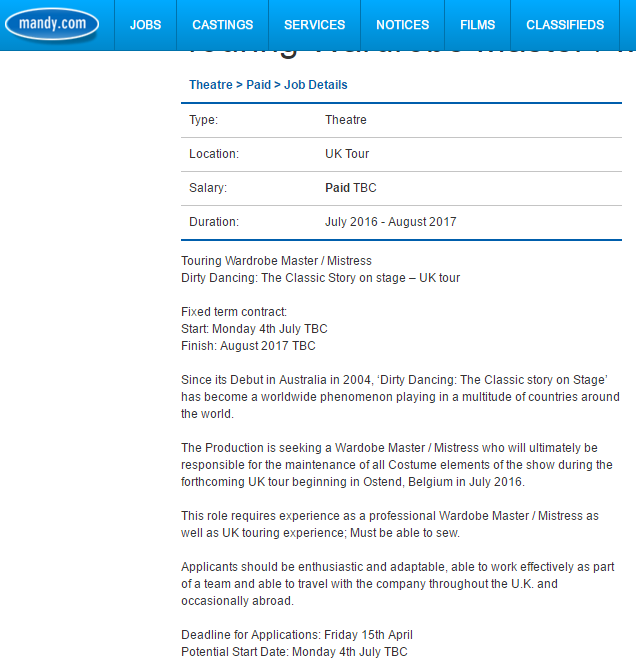
Advantages:
An advantage of a fixed term job is, as an employee, you know you have work for a set amount of time rather than having a permanent job or being tied down to only working with that one particular company, meaning you are able to work for another company after the duration of the current job you’re working on has come to an end.
As an employer, employing an employee under fixed term means that you get an employee to work on what you need them to, without actually offering them a full-time or permanent job with your company. This is seen as an advantage as you would only need to pay the employee up to the point of when the contract ends and not being required to offer them a permanent job in the process.
Disadvantages:
For the employee, a disadvantage of a fixed term job is that after the duration of a fixed term job has come to an end, you no longer work with that company and then need to find another job, either of the same type, or a permanent job in order to earn money.
A disadvantage of a fixed term job for the employer is if the employee they have taken on for the fixed term job position turns out to be a hard worker and someone you view as an employee that could be useful to the company and who you would want working for you, if there is no job available, you have lost an employee that could potentially go on to work for another company, even a competitor of your company.
9 to 5 role (Office/Admin Role)
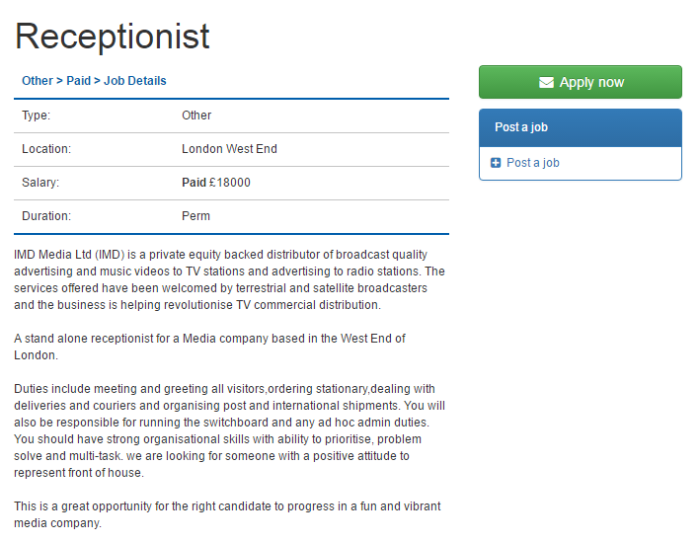
Advantages:
When in a 9 to 5 job role as an employee, you receive a set amount of money for working. You also know that you have a set number of hours and with a 9 to 5 job role, you’re not always necessarily going to work on weekends, so after 5pm and you leave work, you’re free to do what you want. Working a 9 to 5 job role can be a good thing as you already have your hours in place, so there’s no worrying about when work starts on a particular day since every day will have the same hours in this job role.
As an employer of a company, when you employ an employee for a 9 to 5 job, you know that the employee needs to work those hours in order to get paid, so when you pay the employee their wages, you know that those who get paid are responsible workers and are valuable members of staff.
Disadvantages:
If you’re an employee working as a receptionist, you are usually at the front of the business and the go-to person that people will ask if they’re unsure about something. While this would be the point of the job, but when it gets busy, it can be a lot of hard work considering the job position.
9 to 5 jobs can be seen as having disadvantages, and as an employer, you are usually the one who will need to sort any problems out. Using the job as a receptionist, with your employee(s), if they encounter any issues regarding a customer and things start to get busy, a customer might get annoyed and ask to see the manager (employer). This can be viewed as a disadvantage of a 9 to 5 job, as, even though it isn’t the employers job to do the role of a receptionist, there are times where the employer needs to sort things out on behalf of the employee who has encountered an issue, either with a customer or anything else regarding their job.
Freelance
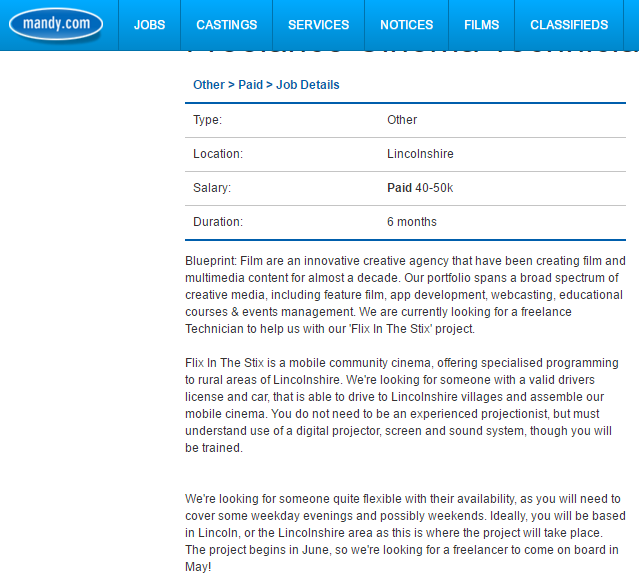
Advantages:
While you are an employee working for a company, you’re still a freelancer, which means that you’re not technically tied to the company as a full-time or permanent employee. This is seen as an advantage in the eyes of a freelancer as you will be able to work for the company without the worry of being restricted to working for that one company. This job role also ensures that you will have 6 months of work with the company.
As an employer, you’re paying a freelancer an agreed amount for work without paying them a wage like an actual employee working at the company full time. Since the freelancer would most likely be doing one job for you, you don’t need to worry about paying out large amounts of money to the freelancer every month like you would with an employee working permanently in your company.
Disadvantages:
As a freelancer, you’re responsible to find your own work, unless someone else offers you work because they have heard of you from other people you have worked for, but this is rare and for the most part, you’re required to find your own work and clients to work for.
As an employer, if you’re impressed by the skills that the freelancer possesses, then you can’t offer them a permanent job with your company as that wouldn’t make them a freelancer, so your only option would be to offer them freelance work as opposed to a permanent job. This is a disadvantage for the employer as the freelancer could easily get hired by another company, possibly a competitor of your company, and do work for them that could potentially get your competitor higher in popularity.
Irregular Patterns
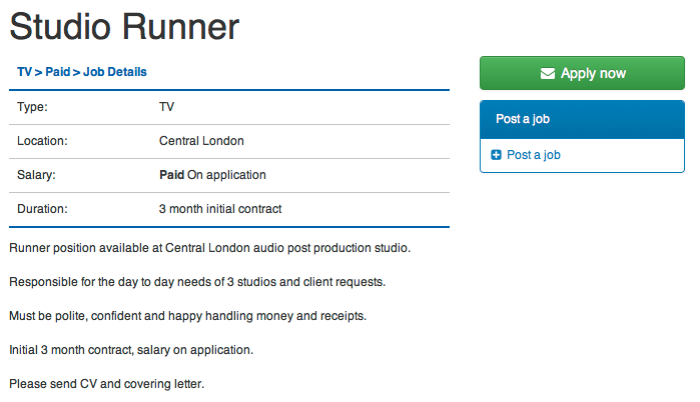
Advantages:
Working on a contract, you don’t have to feel tied to that company permanently, so once the job is finished with, you get paid and are free to look for other work with other potential clients and companies. There is also a period of time where you’re in employment and are guaranteed to be paid for your work.
For the employer, with the job role of the Studio Runner, you have someone who will basically do the harder parts that come with the job, so this is one less thing for you as an employer to worry about as you won’t be the one who will be the person who needs to handle the money and receipts, so this can be considered an advantage to you as an employer, knowing that that side of the work is being taken care of by someone who is happy to carry out this role.
Disadvantages:
You only have a set amount of time that you can work for with the client, so once the job has been completed, there is no more work with this client until another job vacancy comes up, either with the same client, or with a completely different one. This can create issues as another job might not arise for a while, so you’re not earning money.
For an employer that will potentially employ you, a disadvantage would be that if they view you as a talented person and are fitted to the kind of job you’ve been contracted to do, they may not be in a position where they would be able to take on staff, hence why they’re only employing people under a contract of such a short amount of time.
Hourly Paid
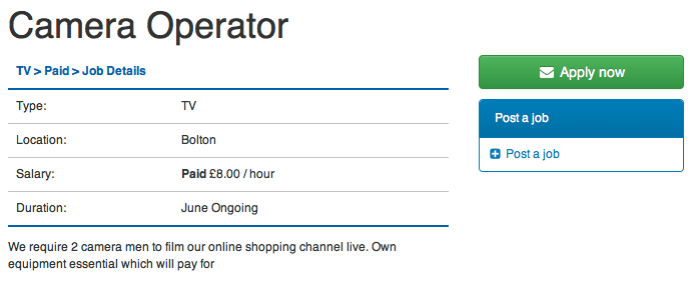
Advantages:
For an employee, you have your payment already stated per hour, so for the job as the camera operator above, each hour you work, you’re paid £8.00. This can be viewed as an advantage as if the employee works for 8 hours as the camera operator, they’re making £64.00 from those 8 hours.
For an employer, an advantage would be that you know how many hours your employee will be working for and the payment amount is already agreed, so the employer doesn’t need to worry about needing to pay the employee over time as the filming schedule will already have been organised, so all the filming days will be set, so the employer wouldn’t need to spend more money than they would have planned to originally.
Disadvantages:
As an employee, time depends on how much money you’re on, so if one moment your employer decides to cut your hours to considerably less, this means that you’re on less money.
Using the camera operator job, for the employer, if the shooting for the project they’re filming and need two camera operators for, runs longer than they originally planned in terms of hours, the employer is required to pay the employee(s) £8.00 for every hour they go over even though they never originally intended the project to run over that amount of hours. This job role can be seen as having a disadvantage, especially for the employer as they would end up paying out more money than they originally intended on doing when they offered positions to work for them.
Paid Work
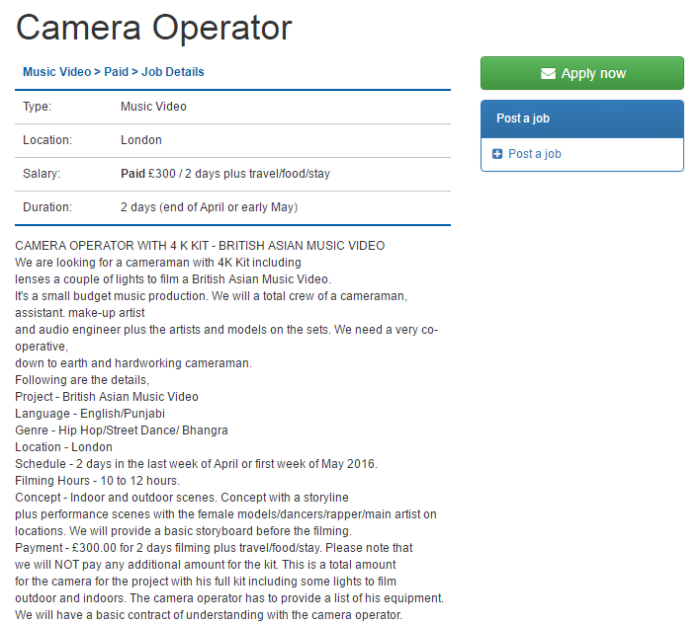
Advantages:
As an employee, an advantage of a paid work job role is you’re paid for the work that you have done, so as an employee, you know that you are going to get paid fully for the work you have done for the company.
As the employer of the company, you get two days worth of filming for the music video by hiring a camera operator, and you only end up paying £300, plus the travel expenses for those two days the camera operator has worked, so this can be seen as an advantage for the employer.
Disadvantages:
With a paid work job role, you’re only paid for the work you do, so once the work has been completed, you get that set amount of payment and are out of work until you find someone else who is looking for someone with the same skills that you have and offering work.
For an employer, the job would only be for a specific project, so once that project has been completed, then the employee no longer has any reason to work for the employer and will move on to another job, which could potentially be a competitor of the company you work at, unless you offer them more work with your company to prevent this potential risk.
Piece Work

Advantages:
When working in a piece work job, you’re paid for the amount of work you do, so an advantage of this type of job is that you can guarantee that the work you do will get you paid in the end.
As an employer, you only pay an employee for the amount of products they produce, so you can guarantee that the workers will work harder and faster in order to complete as many products so they will get paid, which is an advantage for you because you know that the products will be produced quicker.
Disadvantages:
Since you’re paid for the amount of work you do, you don’t get a set amount of money when you get paid as it depends on the amount of products you produce, so this can be viewed as a disadvantage for an employee since if you don’t produce a certain number of products, you won’t get paid as much.
As an employer, you need to ensure that the employee will want to sell their products to them and not someone else, potentially a competitor of that company. In the Script Writer & Story Teller job above, the employers are willing to pay £20 per short film script or story, but if a professional script writer for short films decides that £20 isn’t enough for them to be selling their original idea and may want to step up their pricing per idea they have, so if the employee decides to do this, this might be a disadvantage for the employer as they wouldn’t want to be paying out too much money for a short film idea that might only last 3 minutes in length and they’ve ended up paying out £100+ just for the idea and may run the risk of losing the owner of the idea, which would result in them potentially selling the idea to another company, even the competitor of the company.
Industry Contracts
Confidentiality Agreements:
Confidentiality agreements are contracts that an employer has their employees sign before they start working for them. This contract prevents the employee from discussing any confidential information about the company or its services/products with anyone else.
In a Media Company, a situation where an employee would need to sign a confidentiality agreement is if you’re working on a new movie. While working on the movie, you are required to sign a confidentiality form that prevents you from leaking out or discussing any confidential information about the production of the film, i.e. storyline for the film or the actors starring in the film prior to being officially revealed.
Another situation where a confidentiality agreement would need to be signed if you’re part of a film company and have an idea for a film that you want a certain director to work on, you can ask the film director to sign a confidentiality agreement so that if they don’t want to direct the film idea, then you know that the director won’t go to another film company and potentially suggest the idea to your competitor.
Why is a confidentiality agreement necessary?
A confidentiality agreement is necessary for employers of a company as without them their employees could potentially leak out confidential information that could possibly end up being received by a company’s competitors, which would then put the company at risk.
What are the consequences of breaking a confidentiality agreement?
Getting fired from your job is one of the consequences of breaking a confidentiality agreement. This consequence will still apply to you even if you have signed an employment contract, breaking the confidentiality agreement will also terminate your employment contract, resulting in becoming fired, which is perfectly legal and is in the employer’s rights to do so if they were to fire the employee.
Another consequence of breaking a confidentiality agreement is receiving a reputation for breaching confidentiality. An employer won’t hire an applicant if they have previously broken a confidentiality agreement with a former employer, which will cause issues for the applicant as an employer won’t want to employ someone who has failed to keep information of a their former employer confidential and wouldn’t want to run the risk of the same thing happening to their company by hiring them.
Exclusivity Agreements:
An exclusivity agreement is a contract that binds a person to working for one company and that company alone, and forbids that person from working with another company. This type of agreement can create issues, particularly for freelancers, as they prefer to go from job to job rather than being tied down and restricted to one permanent job.
A situation where an employee would want to sign an exclusivity agreement is if they are good at what they do and enjoy working for a particular company and they know that the company can provide regular work for them. Once the employee with the company signs the exclusivity agreement, they are tied to that company for a certain amount of time, and during this time, they can entire that they’re in permanent employment until their contract expires.
Another situation where an employee would want to sign an exclusivity agreement is if a music company has been working with a singer for a while and the singer wants permanent work with that music company. The singer can sign an exclusivity agreement with the music company, which will allow the singer to work for that one music company for the exclusivity agreement’s duration.
Advantages of signing an exclusivity contract:
From an employer’s point of view, an exclusivity contract can be used to their advantage to benefit their company. An exclusivity contract is very useful as it guarantees that if they hire a freelancer that they consider to be good at what they do, such as graphics design, then they will want to hold on to them so that they can ensure that the freelance graphics designer doesn’t agree to work for another company, or even a major competitor, and potentially help that rival company become more successful.
While signing an exclusivity contract will prevent an employee from working for another company until the contract expires, it can be used to an employee’s advantage, too. While they wouldn’t be allowed to go out and work for another company once they have signed the contract, they can see a positive side to the situation as they would be employed with a company and, while the job most likely wouldn’t pay as much as another freelancing job that could potentially turn up, they would still be earning an income doing the work they enjoy doing.
Disadvantages of signing an exclusivity contract:
From an employee’s point of view, an exclusivity contract can be seen as a bad thing, or something to be thought about wisely before signing as, for a freelancer, they can’t choose who they work for once they sign an exclusivity contract. A freelancer prefers to have the freedom to work for companies without having to worry about being required to take on a job if they don’t want to take it. Also, if a freelancer ends up signing an exclusivity contract, binding them to that company for the contracts duration, and then a job comes up offering a freelancer a certain amount of money that pays better than the job the freelancer currently is in, the freelancer loses the freedom to take on that other job. So a major disadvantage of signing an exclusivity contract is being unable to work for other companies at will, or ones that could potentially pay more. In addition to being unable to work for another company while being tied to an exclusive contract, if a company has a project that doesn’t go well and doesn’t make any money, that means that you aren’t making money from the project either, which then causes issues for the employee as they can’t leave the job they’re not making money from and go to another job in order to earn money by working on their projects.
Links/Sources of Information
Industry Working Patterns: –
Fixed Term: http://www.mandy.com/projob/327093/touring_wardrobe_master__mistress/
Freelance: http://www.mandy.com/projob/326818/freelance_cinema_technician/
Irregular patterns: http://www.slideshare.net/Lucasjwarren/working-patterns
Hourly paid: http://www.mandy.com/projob/331507/camera_operator/
Paid Work: http://www.mandy.com/projob/326046/camera_operator/
Industry Contracts:
Confidentiality Agreement: http://humanresources.about.com/od/glossaryc/g/confidentiality_agreement.htm
When should we use a confidentiality agreement: http://www.wilhelmlaw.com/index.php?option=com_content&view=article&id=127:when-should-we-use-a-confidentiality-agreement&catid=36:blogs&Itemid=77
Exclusivity Agreements: http://mariabrophy.com/business-of-art/should-you-sign-an-exclusive-agreement-what-to-consider.html
Employment Agreements and Contracts: http://www.ehow.com/info_8014464_employment-agreements-contracts.html
Exclusivity Agreements – Advantages and Risks: http://www.darlingtons.com/blog/exclusivity-agreements-advantages-and-risks